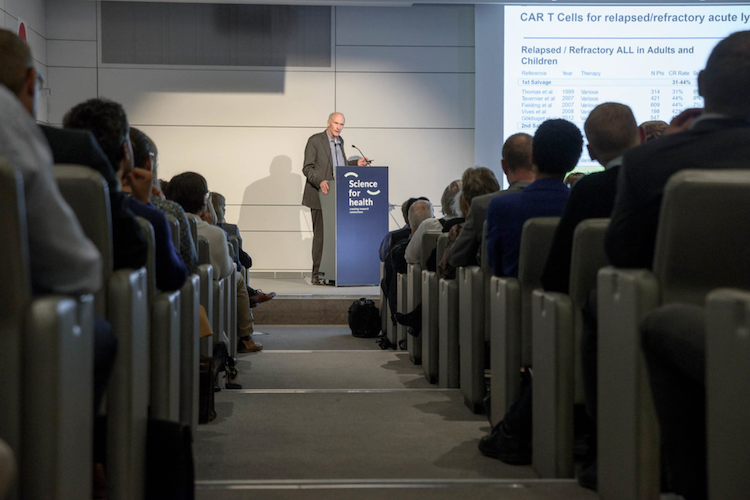The first edition of Science for health was held in the heart of Brussels on 11th September 2019 with a focus on cell therapy. The event attracted over 300 researchers, clinicians and industry professionals active in the the local or international cell therapy ecosystem. Top-speakers provided interesting insights into the current state of cell therapy in Belgium, as well as requirements for further progress. Collaboration, especially outside of the traditional partnerships, is key.
By Amy LeBlanc
The purpose of Science for health is to strengthen the local ecosystem by promoting collaborations across the sector, enabling healthcare solutions that brings benefit to the patients. The conference, supported by Janssen Pharmaceutica, KU Leuven, Ghent University, VIB, imec and flanders.bio, was more than just a chance to meet and greet however: it was a chance to take stock of the current state of cell therapies and assess the needs that will push the field on to further breakthroughs.
What is the current situation for cell therapy?
At Science for health, the morning keynote talks were kicked off by Carl June (University of Pennsylvania), whose pioneering work led to the development of Kymriah, the very first CAR T-cell therapy to get approved. His presentation, covering oncology, was complemented by the second keynote talk by Richard Burt (Northwestern University) who spoke about the transformative potential of stem cell transplants and how new methods are improving outlooks for patients suffering from a range of autoimmune diseases including Multiple Sclerosis, Diabetes, Crohn’s, Rheumatoid Arthritis, and more. These talks illustrated that cell therapy is really coming into its own, maturing at a very rapid pace.
“There are now, worldwide, hundreds of laboratories working on making next-generation CAR cells. I think we’re seeing very rapid progress in the sophistication of the therapies, to make them more potent and less toxic.” – Carl June, University of Pennsylvania
Belgium as a growing cell therapy hub
Another message that was made clear at Science for health was that the Belgian ecosystem has the potential to become a prominent cell therapy hub. From academia to industry, Belgium has all the ingredients for success and is proving to be a fertile ground for innovation.
“It’s really exciting to come back to Brussels; I’ve collaborated with investigators here for about thirty years, and to now see the growth of the ecosystem and explosion of interest here is fantastic.” – Carl June, University of Pennsylvania
At the event, Belgium’s top universities and research institutes showcased their innovative work in both oncology and regenerative medicine. The ecosystem is particularly strongly positioned for clinical cell therapy research, with four certified centers participating in clinical trials and administering cell therapy products to their patients. This clinical branch is also backed by strong manufacturing expertise from both start-ups through to world-class companies.
What we need to move forwards
It is clear that Belgium has a vibrant life sciences ecosystem and the potential for developing new cell therapies is strong. What we need, to grow as a cell therapy hub, is further collaboration and cross-fertilization between sectors. While innovative work being done every step along the way, bringing players together will streamline the development process drastically and bring new treatments to the patient faster.
For example, we will need to see more collaborations between researchers and clinicians. Due to the current boom in cell therapy clinical trials, hospitals are overwhelmed with the number of studies they receive. Therefore, researchers running studies should make them as easy as possible to implement. As cell therapies can be considered “living drugs”, they represent unique challenges.
“Belgium has a quite unique role in cell therapy and immunotherapy in general. In Ghent we have been really privileged partners in several CAR T trials.” – Tessa Kerre, UZ Gent
It’s not only about coming up with new therapeutics, however. To develop the new generation of manufacturing technologies, contract development and manufacturing companies collaborate closely with academia. In client projects, neither the time nor resources are available to develop and optimize new techniques.
“You have a lot of stakeholders that are needed to get cell therapy from idea to patient: small companies, big companies, research institutes and hospitals.” Jan Schrooten, Antleron
Finally, stakeholders should also think out-of-the-box when setting up partnerships and look beyond the typical pillars of the ecosystem. This was exemplified by Peter Peumans, from the Belgian tech hub imec, who spoke about how advances in microchip technology can provide solutions to numerous cell therapy challenges. The increasing miniaturization opens the door to the high-throughput analysis and manipulation of single cells on micro-chips. Such cross-fertilizations between life sciences and technology can be powerful drivers of innovation.
The start of something new
Interest in the 2019 edition of Science for health was palpable from the start, with tickets selling out weeks in advance. The first edition of Science for health was a resounding success and the partners are already looking forward to the unveiling of next year’s theme. In 2020, participants will have the chance to catalyze innovation by creating research connections on a different topic!
“We’ve seen that this is a very powerful format for bringing academic people and company people together to focus on a specific disease area. We will continue with this concept and, in the future, focus on other domains where we will bring all the key players together to advance science in the region.” – Dirk Reyn, flanders.bio


